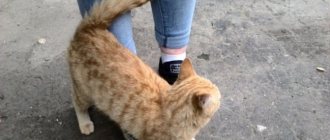Feline immunodeficiency virus (FIV), along with leukemia virus (FeLV), is a serious disease that damages the immune system. These two diseases have much in common, but at the same time they also have fundamental differences. Both are caused by retroviruses and have similar symptoms, indicating suppression of the animal's immune system. Their main difference is that after entering the body of their victim, the pathogens manifest themselves in different ways. If the feline leukemia virus affects bone marrow cells, the immunodeficiency virus inhibits the immune cells themselves - T-leukocytes, depriving them of their ability to protect the body from infections. The human immunodeficiency virus (HIV) works in a similar way. This article describes what kind of disease this is, how it progresses, methods of treatment and prevention are described, and most importantly, whether the disease can be transmitted to humans.
What is VIC
Feline immunodeficiency virus (FIV) is an infectious disease that depletes the immune system. Most often, it affects cats over the age of 5 years, who roam freely on the street or live in crowded conditions.
Description of the virus
The international name for feline immunodeficiency is FIV, or Feline Immunodeficiency Virus. It is caused by a lentivirus, which has a long incubation period. This pathogen is part of the retrovirus family and is a close relative of HIV.
The FIV virus was discovered by Americans when they found it in a Californian nursery. Despite its relationship with HIV, the feline infection has its own differences. The pathological effect of the pathogen occurs on T-lymphocytes, which are responsible for the acquired immune response. With timely treatment, a sick pet can live a long and happy life.
Danger to the animal
Due to the depletion of the immune system, secondary infections occur. Having lost its defenses, the body cannot fight back, so the animal often dies due to concomitant diseases.
An equally dangerous consequence is leukemia, that is, blood cancer. This cancer develops against the background of hematological disorders, accompanied by severe anemia (anemia).
Mechanism of action of the virus
The main route for the virus to enter a cat’s body is through damaged skin. Once in the blood, it damages mature immune cells. Infected white blood cells can no longer perform their functions, which leads to a permanent decrease in immunity. The peculiarity of the FIV virus is that it has many different subtypes or serotypes, which makes it impossible to create a strong vaccine against it.
As with HIV infection, which is transmitted by people, there have been no documented cases of recovery in immunocompromised pets.
Is FIV transmitted to humans?
HIV in humans and FIV in cats are diseases caused by different pathogens from the same family. Because of this feature, neither an animal nor a person can infect each other. However, owners of sick pets should not let their guard down. With secondary infection, they can become infected from their baleen:
- leptospirosis;
- protozoal infections (toxoplasmosis, giardiasis, cryptosporidiosis);
- ringworm;
- helminthiasis;
- rabies and other dangerous pathologies.
Children under 12 years of age whose immune systems are still developing are at risk. For this reason, it is recommended to limit communication with an infected pet.
Disease prognosis
The prognosis is determined by the strain of the pathogen, the state of the cat's immune system, and whether it receives treatment and proper care. The life expectancy of infected cats is lower than that of uninfected cats; the average difference is 1–2 years. At the same time, the life expectancy of a pet with advanced clinical immunodeficiency rarely exceeds 1–2 years, so the prognosis for life in each specific case can be difficult to determine. In some cats, the virus remains in a latent state throughout its life and has no clinical manifestations.
Ways of infection of cats
Transmission of the virus occurs by contact through the patient’s biological fluids: sperm, blood, saliva. An animal can become infected:
- during mating;
- in utero;
- during blood transfusion (blood transfusion);
- from a bite or scratch through saliva;
- during licking by an infected person (provided there are lesions on the skin or mucous membranes).
Cats living outside are more aggressive than domestic cats. To survive, they have to fight for food and shelter, so they are at risk. The number of infections is also influenced by uncontrolled matings, common among stray animals.
Prevention measures
Preventive measures include:
- avoiding contact with infected animals, which occurs when a cat free-ranges;
- castration of a pet will reduce aggressive behavior and the likelihood of infection from a bite received in a fight;
- 3-month quarantine when introducing a new cat into an established cat community, with control tests taken at the beginning, as well as at the end;
- mandatory testing for viral immunodeficiency of animals participating in breeding work and removal of infected ones.
Main symptoms
Symptoms of immunodeficiency in cats do not appear immediately. In 18% of those infected, the disease is asymptomatic, reminding of its existence only after the development of secondary diseases.
The first alarming symptoms can be detected after the end of the incubation period. These include:
- inflammation of the lymph nodes;
- loss of activity and appetite;
- hyperthermia (temperature rises above 40 °C);
- weight loss;
- diarrhea and severe dehydration.
With subsequent infection with other infections, the symptoms expand. At this point, the patient’s condition attracts the owner’s attention, as the clinical picture becomes more specific.
Stages of the disease
Symptoms of FIV in cats depend on the stage of the disease. The incubation period takes from 1 to 1.5 months. Upon completion, the pathology develops in 3 stages:
- Acute stage
. The appearance of clinical symptoms of acute viral infection. The number of leukocytes in the blood decreases, which can be noticed using laboratory diagnostics.
- Latent period
. Takes about 3 years. Symptoms that appeared earlier disappear even without treatment, which complicates the timely detection of the disease.
- Immunological deficiency
. When secondary pathologies are added, inflammatory processes develop in the lungs and urinary tract, chronic stomatitis, rhinitis and other diseases of the nasopharynx. Skin pathologies characteristic of parasitosis, fungal and bacterial infections may also be observed.
If immunodeficiency is detected at a late stage, the prognosis is disappointing. For this reason, it is important to be examined at a veterinary clinic if even the most minor abnormalities appear. If a cheerful pet with a good appetite falls into apathy and refuses its favorite treats, do not expect self-healing. The sudden disappearance of alarming symptoms is just the calm before the storm.
Forecast
The prognosis for feline viral immunodeficiency is cautious. In 20% of cases, animals die within 2 years from the moment of diagnosis (4-6 months from the moment of infection), but more than 50% of infected animals remain clinically healthy at this time. At the last stage of the disease (exhaustion, frequent and severe infections), the average life expectancy is about one year.
(c) Veterinary center for the treatment and rehabilitation of animals “Zoostatus”. Varshavskoe highway, 125 building 1. tel.
8 (499) 372-27-37
Visit to the veterinary clinic
The main method of diagnosing FIV is to examine the blood donated for testing. All other checks are individual and depend on the condition of the animal.
Diagnostics and tests
During the initial examination, a sample of biomaterial is taken from a vein from a mustachioed patient. In the laboratory, it is used to carry out the following tests:
- complete blood count (CBC) and blood biochemical test (BAC), demonstrating elevated protein levels and low numbers of neutrophils, red blood cells and lymphocytes;
- serodiagnosis, or enzyme-linked immunosorbent assay (ELISA), which determines the presence of antibodies to the virus;
- polymerase chain reaction (PCR), which detects DNA fragments of an infectious agent.
The disadvantage of serodiagnosis is that during the incubation period, 10% of FIV-infected people may not develop antibodies. It is also possible for antibody levels to drop sharply, preventing their detection. If the ELISA result is negative and there are abnormalities in the CBC and LBC, PCR diagnostics are mandatory.
Possible maintenance therapy
Treatment of immunodeficiency in cats comes down to eliminating associated symptoms and maintaining immunity. A drug that directly combats the pathogen has not yet been developed.
Veterinarians use analogues for humans as antiviral drugs: Zidovudine, Anti-Flu Immunoglobulin and Virbagen Omega. When they are discontinued, the animal experiences a sharp deterioration in its health, so it must be taken for the rest of its life.
Maintenance therapy is based on the use of:
- immunomodulators (Ribotan, LTCI, Anandin), stimulating the immune system;
- antibiotics (Penicillin, Ampiox, Ampicillin) that suppress the effects of pathogenic microorganisms;
- antihistamines (Suprastin, Diphenhydramine) and glucocorticosteroids (Prednisolone, Dexamethasone), which have anti-inflammatory, antiallergic and antitoxic effects;
- drugs that fight hematological disorders (Leucostim, Epocrine).
In case of severe anemia, a blood transfusion is performed to increase the number of lymphocytes and red blood cells. Despite the good result, the effect of this procedure is temporary. There is also a risk of intolerance to foreign blood cells, which can be fatal.
Caring for a sick animal
If your pet is diagnosed with FIV, remember the following rules:
- A sick cat should not be allowed outside (this is to prevent infection of other animals and protect your pet from various infections).
- Such animals need to be neutered.
- Immunocompromised cats should not be vaccinated.
- Every six months you need to undergo examinations (body weight, examination of lymph nodes, eyes, skin, etc.).
- Blood tests (general and biochemical tests) should be performed once a year.
The owner of an infected pet will have to follow some rules for caring for the cat.
In addition, you will have to give your cat the medications prescribed by the veterinarian. If there is a risk of missing any medication, you can ask a relative. It is also worth using the services of a cat hospital. In veterinary clinics where this service is provided, veterinarians are on duty around the clock - they will give the necessary injections and give pills. I have used a similar service: it is inexpensive, and the supervision of professionals is much better than the help of relatives.
In addition, the sick cat is prescribed a diet (for this you need to consult with the treating veterinarian). The food of an infected animal must be carefully balanced and healthy.
Forecasts for the future
The prognosis directly depends on the condition of the animal and the course of the disease. If diagnosed at a late stage, a cat can live for about a year. At this point, the body is severely depleted by chronic diseases and is maximally vulnerable to any infections.
Death from FIV is rare. On average, cats with this diagnosis live 5-8 years. Given the average life expectancy, FIV-infected pets are more likely to die from old age rather than from infection.
To ensure a long and happy life for a mustachioed pet, the owner will have to regularly give it all the necessary medications and protect it from other diseases with the help of:
- Castration and sterilization. After the operation, the animals become calmer and less likely to get into fights with their relatives.
- Isolation from other animals. Due to a weakened immune system, another infection on the street can be fatal. This will also prevent further spread of FIV.
- Timely treatment for fleas, ticks and worms.
- Avoiding stress. During exciting events (moving, birth of a child, renovation), use calming medications with pheromones.
- Annual vaccination. Vaccinations are permissible only in latent cases and only in a “killed” form. A vaccine administered during an acute form can lead to severe complications.
- Therapeutic diet. Veterinarians recommend using dry food. They prevent the formation of tartar, which is the cause of many diseases.
- Annual blood donation. Regularly checking the results will help to identify possible deviations in a timely manner and adjust the treatment plan.
Before contacting a sick pet, be sure to wash your hands and do not forget to put away your outdoor shoes immediately after returning home. Check the condition of your cat's skin, fur, and mouth daily. The cat must be weighed once a week to guard against sudden weight loss.
Treatment or maintenance therapy for the cat
First of all, the cat owner must understand that FIV cannot be cured. It is only possible to achieve remission of the disease, alleviate the pet’s condition and alleviate symptoms.
There is no specific vaccine against FIV. The basis for the fight against immunodeficiency in cats is the treatment and prevention of secondary infections with the help of antibiotics (Ampiox, penicillin, Ampicillin, cephalosporins). As well as relief from severe illness.
Treatment of animals with special feline interferons, which interrupt the development of the virus, has become promising. The treatment plan includes:
- anti-influenza or anti-measles immunoglobulin for humans, dose 0.5-1 ml. It is administered intramuscularly or subcutaneously 1 time/2-3 days. The duration is prescribed by the veterinarian, based on the cat’s well-being;
— vitamins and multivitamins;
- antihistamines (“Tavegil”, “Suprastin”, “Dimeldrol”, “Pipolfen”, etc.).
In some cases, antiretroviral drugs (Zidovudine) designed for humans are prescribed. They cannot completely cure FIV, but they improve the animal’s severe condition.
A FIV-infected cat should be monitored by a veterinarian at least once every six months to monitor the course of the disease. With maintenance therapy, a cat with immunodeficiency can live more than 6 years.











